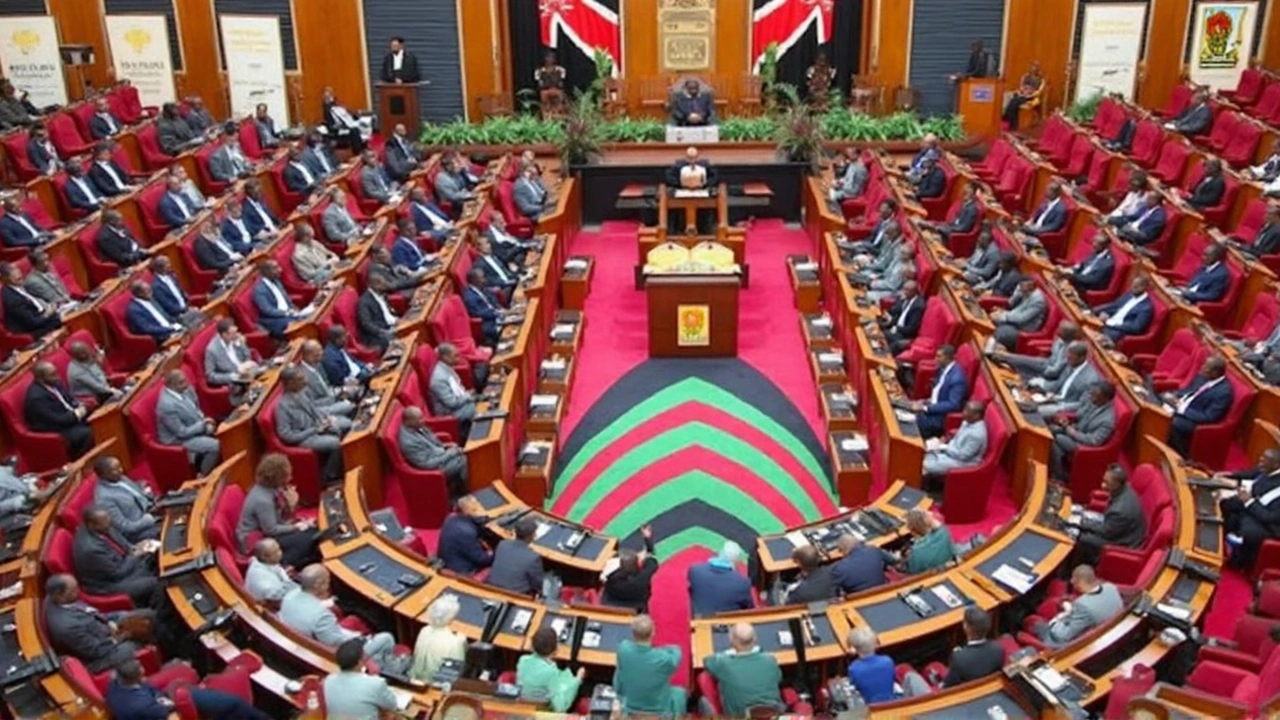A New Era for Kenya's Tax System
Kenya just rewrote the playbook with the Finance Bill 2025. President William Ruto signed off on aggressive changes, seeking to supercharge economic growth and make the country more appealing to investors. This move follows hot debate in the National Assembly, which passed the bill on June 19. It slices through six heavyweight tax laws—think the Income Tax Act, Value Added Tax Act, and Excise Duty Act—with one main goal: to get Kenya’s economy speeding ahead, especially in financial and tech sectors.
Probably the biggest shake-up is the new five-year cap on tax loss carry-forwards for multinationals. Before this, big firms could stretch out losses indefinitely. Now, they have to turn things around faster, or lose out. The change is targeting those sneaky profit-shifting tactics global companies sometimes use. The government hopes this will boost tax compliance and keep more revenue inside Kenya's borders.

Nairobi International Financial Centre: Incentives Galore
Another bold move is a treasure chest of incentives for firms operating out of the Nairobi International Financial Centre (NIFC). This isn’t just a couple of tax breaks. Startups get a super-low 15% corporate tax rate for their first three years, and only 20% for the next four. Meanwhile, deep-pocketed investors—those pouring in at least KES 3 billion—also see a 15% rate, but for an entire decade. After that, it's still an attractive 20%.
- Startups: 15% corporate tax for 3 years, then 20% for 4 years.
- Big investors (KES 3 billion plus): 15% rate for 10 years.
- Dividend exemptions: Reinvest KES 250 million, pay zero tax on dividends.
For companies working within Special Economic Zones, capital gains tax is slashed to zero on property transfers. Investors holding securities okayed by the NIFC Authority get a break too, as their capital gains tax tumbles from 15% down to just 5%. These perks are designed to get both new and seasoned investors moving their money (and probably their HQs) to Nairobi.
On the VAT front, there’s some real help for makers and growers. Machinery and raw materials for mosquito repellents now get a zero VAT bill, which could make fighting tropical diseases cheaper. Tea and coffee exporters see exemptions on packaging materials, a long-requested measure intended to spike their global competitiveness. For a country that relies on agriculture, this tweak should help boost local jobs and hard currency earnings.

The Digital Shift: New Rules for the Online Economy
The Finance Bill also takes a big swing at the fast-moving digital sector. The definition of the Significant Economic Presence tax is now much wider, applying to all online services—think apps, streaming, marketplaces—without worrying about revenue minimums. The government is looking to stamp its authority on the digital world, where money often slips through the cracks.
- Non-resident digital companies can now cement their tax liabilities upfront through new Advance Pricing Agreements.
- Betting gets a shake-up: taxes are hit at the moment punters withdraw their winnings, not when they top up their accounts.
- A 5% excise duty targets fees paid to virtual asset providers, replacing the old Digital Assets Tax.
These measures look to squeeze more revenue from the booming digital economy—but also promise some predictability to global tech companies wondering if it's worth the hassle operating in Kenya.
The Finance Bill 2025 isn’t all about snatching more revenue, though. It also introduces automatic tax reliefs on certain pensions, gratuities, and allowances, meaning some payouts skip taxation altogether. Excise duty rates are now lined up with the East African Community’s Common External Tariff, so classification is a bit more predictable for importers.
Kenya’s tax landscape just got more complicated—but in ways that might actually help the country punch above its weight in Africa’s economic ring. These changes, especially the ones focused on digital services, manufacturing, and giant foreign investors, could easily make Nairobi the region’s hottest business hub. For now, all eyes are watching to see if this major experiment brings the growth everyone hopes for.


Reagan Traphagen
June 27, 2025 AT 02:43The Finance Bill looks less like a development plan and more like a covert operation to funnel Kenyan revenue into the hands of global financiers.
It's clear the Ruto administration is being puppeteered by an offshore cabal that thrives on tax complexity.
By capping loss carry‑forwards at five years they claim to “stop profit‑shifting”, but the real aim is to force multinational shells to dump their cash back into the country where they can be skimmed.
The new incentives for the Nairobi International Financial Centre read like a golden ticket for the same elite firms that already dominate the market.
A 15 % corporate tax rate for startups sounds generous, yet those startups quickly become acquisition targets for the very investors the bill flatters.
The ten‑year, 15 % rate for investors putting in KES 3 billion is a direct subsidy that will never be repaid by ordinary Kenyans.
Capital‑gains tax slashes to 5 % are simply a tax holiday that will disappear once the foreign capital stops needing a break.
The zero‑VAT on mosquito‑repellent machinery is a nice PR stunt, but it does nothing to address the root causes of disease.
The digital‑services tax expansion is a blanket grab that will hit small app developers the hardest while big platforms can afford the compliance costs.
Advance Pricing Agreements sound like fairness, but they give the tax authority a back‑door to negotiate bespoke rates with the same multinationals they accuse of avoidance.
Betting taxes on withdrawal instead of deposit merely shifts the burden onto everyday gamblers, not the wealthy operators.
The 5 % excise on virtual‑asset fees replaces a vague digital assets tax, but it still extracts revenue from ordinary users of crypto services.
All these measures create an illusion of “growth‑friendly” policy while actually widening the gap between Nairobi’s elite and the rest of the population.
The bill also pretends to protect pensions and gratuities, yet the loopholes are enough for the government to siphon off those funds later.
In short, the Finance Bill is a sophisticated tax‑capture scheme designed by invisible hands that thrive on complexity.
Kenya’s economy will only “boost” if the average citizen gets a say in who benefits from these reforms.
mark sweeney
July 20, 2025 AT 10:26One might argue that the bill is simply a pragmatic attempt to modernise the tax code, but that narrative feels as contrived as a philosopher’s paradox with a missing premise.
Thein actual effect is to create a new class of privileged investors who will chalk up the tax breaks as "fair" while the rest of society bears the hidden compliance burden.
It’s almost as if the lawmakers are playing a game of chess, moving the pieces while the pawns never even see the board.
Sure, the incentives look shiny, but remember that every tax holiday is a loan the state takes from future generations.
And let’s not overlook the digital‑services tax, which could tide‑over revenue gaps only to widen them when HNIs move capital offshore anew.
In short, the bill is a clever cover for a deeper agenda that prefers the elite over the everyday Kenyan.
randy mcgrath
August 12, 2025 AT 14:00I see the bill as a mixed bag; the push for tech and finance could spark growth, yet the aggressive tax rules might deter the very investors they aim to attract.
Balancing revenue needs with a welcoming climate is tricky, especially when policy shifts so quickly.
It will be interesting to watch how the new loss‑carry forward limits impact multinational strategies over the next five years.
Overall, the outcomes will depend on implementation and whether the promised incentives translate into real jobs.
Frankie Mobley
September 4, 2025 AT 17:33The Nairobi International Financial Centre incentives are fairly straightforward: startups get a low 15 % corporate tax for three years, then 20 % for the next four, which can ease early cash‑flow pressures.
Large investors putting in at least KES 3 billion enjoy a 15 % rate for a full decade, after which the rate rises to 20 % – a clear signal that the government wants long‑term capital commitment.
Dividend exemptions on reinvested capital of KES 250 million mean zero tax on those dividends, encouraging profit retention.
For firms in Special Economic Zones, capital‑gains tax on property transfers is waived, supporting real‑estate development.
Security‑type securities approved by the NIFC Authority see capital‑gains tax cut from 15 % to 5 %, which should attract more investment funds.
All of these measures aim to make Nairobi a hub for finance, but the real test will be how smoothly the tax authority processes these benefits.
Businesses should stay informed of the paperwork requirements to avoid unexpected compliance costs.
In short, the incentives could be a catalyst for growth if the administrative side keeps up.
ashli john
September 27, 2025 AT 21:06Awesome move for Kenya keep it up
Kim Chase
October 21, 2025 AT 00:40Definately a big step forward but we gotta watch how it plays out for everyday folks and make sure the benefits reach them too